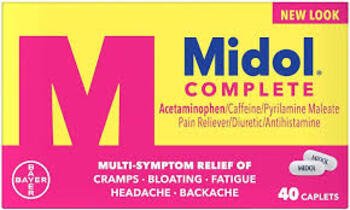Introduction:
When that time of the month rolls around, many individuals seek relief from the discomfort and pain associated with menstruation. One popular over-the-counter option for such relief is Midol. In this comprehensive guide, we’ll delve into what Midol is, how it works, its ingredients, usage instructions, potential side effects, and frequently asked questions to provide you with all the information you need to know about this common menstrual relief medication.
What is Midol?
Midol is an over-the-counter medication primarily used to alleviate symptoms associated with menstruation, such as cramps, bloating, headache, backache, and muscle aches. It is available in various formulations, each targeting specific symptoms, including Midol Complete, Midol Extended Relief, and Midol Teen.
Ingredients:
Midol typically contains a combination of active ingredients, including:
Acetaminophen: A pain reliever and fever reducer.
Caffeine: A stimulant that can help enhance the effects of pain relievers and alleviate fatigue.
Pyrilamine maleate: An antihistamine with mild sedative effects, which may help relieve symptoms like tension and irritability.
Naproxen sodium: A nonsteroidal anti-inflammatory drug (NSAID) that reduces pain, inflammation, and fever.
How Does Midol Work?
Midol works by targeting the underlying causes of menstrual discomfort. Acetaminophen and naproxen sodium help to alleviate pain and inflammation associated with menstrual cramps and other symptoms. Caffeine can enhance the effectiveness of these pain relievers and may also help alleviate fatigue. Pyrilamine maleate may contribute to reducing tension and irritability commonly experienced during menstruation.
Usage Instructions:
It is essential to follow the recommended dosage instructions provided on the packaging or by a healthcare professional when taking Midol. Typically, adults can take one to two caplets every four to six hours as needed for relief, with a maximum of six caplets in 24 hours. It is crucial not to exceed the recommended dosage to avoid potential side effects.
Potential Side Effects:
While Midol is generally considered safe for most individuals when taken as directed, it may cause side effects in some cases. Common side effects may include:
-Nausea
-Upset stomach
-Dizziness
-Drowsiness
-Headache
In rare cases, more severe side effects such as allergic reactions or liver damage may occur. If you experience any unusual symptoms or adverse reactions while taking this medicine, it is essential to discontinue use and consult a healthcare professional promptly.
FAQs:
Q: Can Midol be taken on an empty stomach?
A: While Midol can be taken with or without food, taking it with food may help reduce the risk of stomach upset for some individuals.
Q: Can I take Midol if I have other medical conditions or am taking other medications?
A: It is essential to consult with a healthcare professional before taking this medicine if you have any underlying medical conditions or are taking other medications, as it may interact with certain drugs or exacerbate certain health conditions.
Q: Can Midol be used for conditions other than menstrual discomfort?
A: While it is primarily marketed for menstrual relief, some individuals may use it to alleviate pain or discomfort associated with other conditions. However, it is essential to use it as directed and consult with a healthcare professional if you have any concerns.
Q: Is Midol safe for pregnant or breastfeeding individuals?
A: Pregnant or breastfeeding individuals should consult with a healthcare professional before taking Midol, as some of its ingredients may not be recommended during pregnancy or lactation.
Conclusion:
In summary, the over-the-counter medication discussed in this guide offers comprehensive relief for menstrual discomfort, addressing symptoms such as cramps, bloating, headache, and muscle aches. By understanding its composition, how it functions, and potential side effects, individuals can make informed decisions about its use. Always adhere to recommended dosage instructions and consult a healthcare professional if you have any concerns or experience adverse reactions. With this knowledge, you can effectively manage menstrual symptoms and improve your overall well-being during that time of the month.
